Top 23 Seobility Alternatives & Competitors in 2024
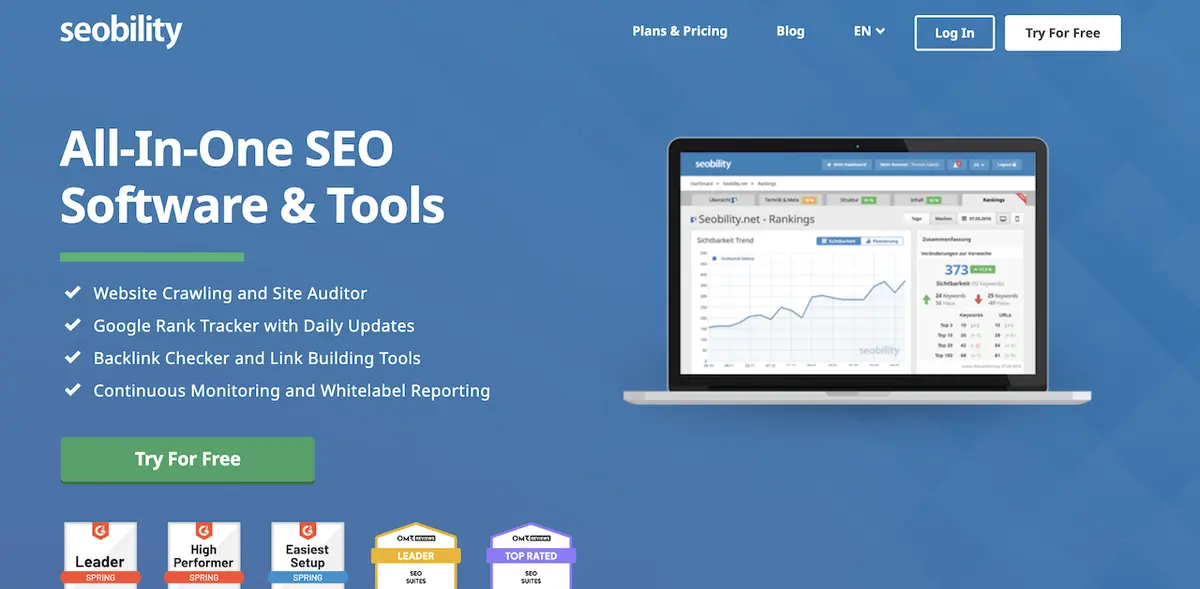
Seobility offers a range of SEO software tools for website optimization. Features include website crawling, rank tracking, backlink checking, and ongoing monitoring, serving as a complete solution for businesses looking to improve their online visibility. This platform provides a detailed analysis of your website’s performance, highlighting areas needing improvement, from on-page optimization issues to duplicate content. Its user-friendly interface allows both beginners and experienced users to navigate through the various tools easily, making the complex world of SEO more manageable.
In a crowded market of SEO tools, Seobility stands out for its all-in-one approach, helping over 500,000 users streamline their SEO processes. Businesses can conduct site audits, track keyword rankings daily, and gather insights on competitors, all while receiving regular updates. The platform also focuses on sustainability, ensuring that website reviews are ongoing rather than one-time checks. This commitment to continuous improvement helps users adjust their strategies as search engine algorithms change, ultimately driving better results over time.
While seobility is a great product, it’s always good to shop around and look for alternatives. This article identifies some top competitors and their pros and cons.
Ahrefs
Ahrefs is a major player in the SEO software space, known for its strong suite of tools that support marketers and SEO professionals. Since its start, Ahrefs has built a reputation for providing some of the best data and insights in the industry. Trusted by a segment of the Fortune 500, Ahrefs offers an all-in-one marketing intelligence platform that covers a range of functions.
One standout feature is Site Explorer, which lets users analyze competitors’ websites and discover their strongest pages, backlinks, and keyword rankings. This helps businesses refine their strategies by learning from established players in their field. Another essential feature is its Site Audit tool, which identifies issues affecting a website’s health and performance.
Ahrefs also excels in keyword research with its Keywords Explorer, making it easy to understand what customers are searching for and how to align content so. The Content Explorer provides insights into trending topics and helps users refine their content strategy, while the AI Content Grader improves the quality of existing content.
Ahrefs distinguishes itself from alternatives like alt_23 with its extensive data collection and real-time processing capabilities. This gives users access to accurate and timely information, improving decision-making. The company emphasizes community support through platforms like Ahrefs Insider, fostering collaboration among users and creating a network of SEO professionals ready to share their expertise.
Pros
- Comprehensive toolset covering various aspects of SEO
- High-quality, reliable data
- Strong community support for users
Cons
- Can be overwhelming for beginners due to the large number of features
- Pricing can be a consideration for small businesses
SEMrush
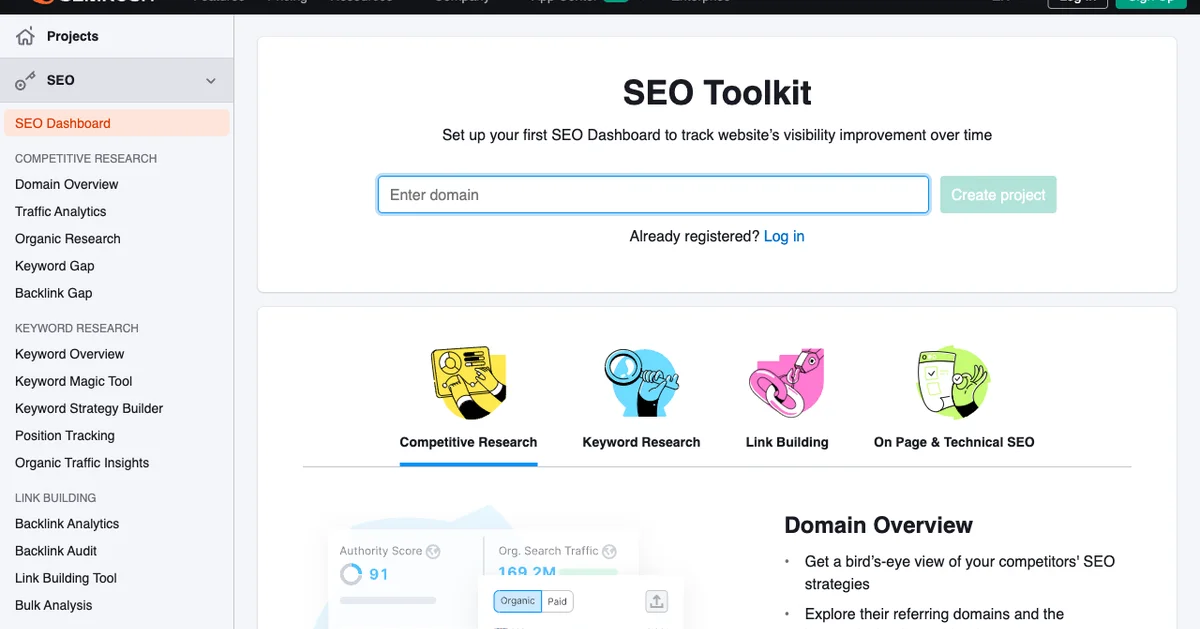
SEMrush is a known player in the SEO software market, offering a suite of tools designed to help businesses improve their online visibility. Founded in 2008, the platform has grown from a small software project into a leading solution serving digital marketers, SEO professionals, and agencies. What sets SEMrush apart are its unique features tailored for different aspects of search engine optimization.
One standout offering is the Domain Overview tool. It allows users to gain insights into competitors’ SEO strategies, revealing their referring domains, keyword rankings, and performance across devices. The Competitive Research and Organic Research tools are valuable for analyzing competitors’ traffic sources and their successes in organic search, which can lead to identifying new opportunities for your business.
SEMrush enhances keyword analysis with tools like the Keyword Magic Tool and Keyword Gap. These features suggest a wide range of keywords for content strategies and highlight those you might be missing—meaning an opportunity to capture traffic that your competitors are enjoying. The platform’s Backlink Analytics and Link Building tools provide data on competitor backlinks, enabling users to uncover high-quality link-building opportunities.
For those looking to improve site health, the Site Audit feature assesses your website against over 60 SEO checks, prioritizing issues that should be addressed first. This approach to SEO management makes SEMrush an all-in-one solution that can adapt to various needs and strategies.
SEMrush serves as a complete SEO toolkit, suitable for both newcomers and experienced marketers.
Pros
- In-depth competitive analysis
- Extensive keyword and backlink research tools
- Comprehensive site audit features
- User-friendly interface
- Excellent support resources
Cons
- Pricing may be high
- Learning curve for some advanced features
- May overwhelm users with too much data at first
Moz

Moz is a key player in the SEO software market, known for its suite designed to help businesses improve online visibility. Founded to make SEO more accessible, Moz has become a trusted resource for over 500,000 brands and agencies seeking to optimize their marketing strategies. At the core of Moz’s offerings is Moz Pro, an all-in-one SEO toolkit that empowers users to improve their search engine rankings and drive targeted traffic to their websites.
A unique feature of Moz is its focus on keyword research and content optimization. By providing insights into quality keywords, Moz helps users create content that resonates with both Google and their target audiences. Moz also excels in identifying and fixing technical SEO issues, allowing users to maintain site health while tracking performance. The ability to monitor daily changes across many SERPs through their STAT platform keeps users informed about their SEO landscape.
The competitive insight from Moz is another differentiator. It analyzes competitors and identifies gaps in keyword strategy, enabling businesses to adapt and excel. This adaptability is essential in a changing digital environment. Moz’s API allows for deeper integration and custom tool building, appealing to technically inclined users who want to add SEO metrics to existing dashboards.
For local businesses, Moz Local stands out with its management of listings and reviews, helping users maintain a consistent online presence while engaging customers effectively.
Pros
- Comprehensive SEO toolkit with keyword and content optimization
- Strong technical SEO analysis and tracking
- Valuable competitive insights and reporting
- User-friendly interface supporting various levels of expertise
Cons
- May be overwhelming for beginners due to its extensive features
- Pricing may be a factor for small startups looking for free solutions
Screaming Frog
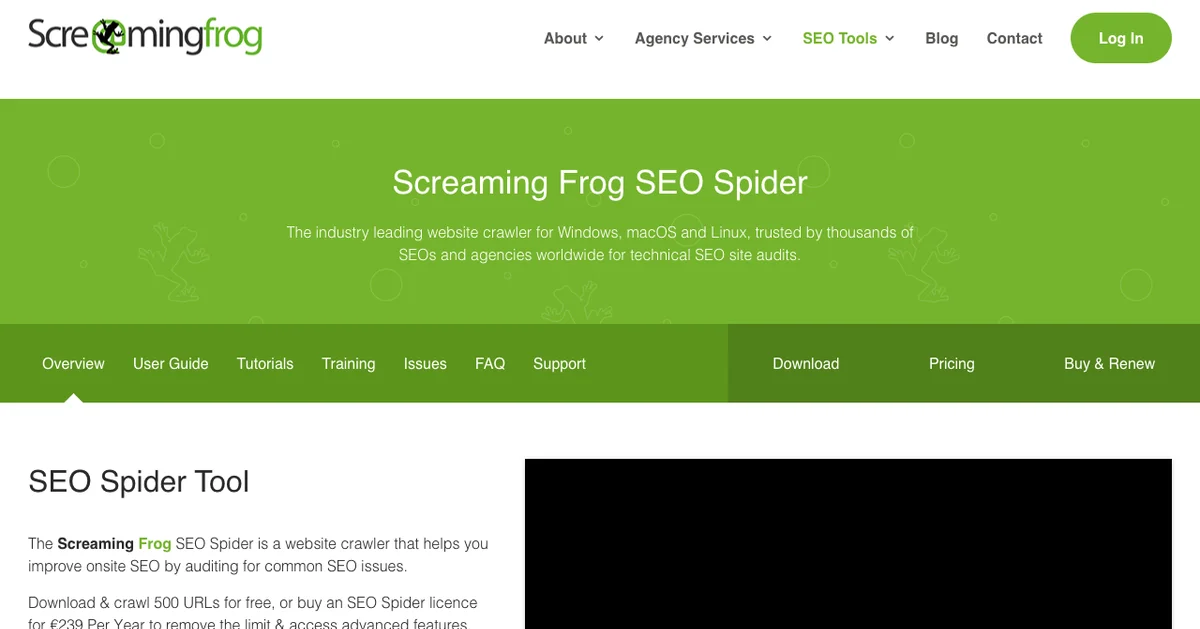
Screaming Frog is a key player in the SEO software market, known for its SEO Spider tool. It’s a website crawler that helps businesses identify and fix common onsite SEO issues. Founded in 2010, Screaming Frog has built a reputation by delivering reliable and efficient tools that serve SEOs, digital marketers, and agencies of all sizes worldwide.
A standout feature of the Screaming Frog SEO Spider is its ability to crawl both small and large websites seamlessly. It gathers valuable onsite data in real time, allowing users to find broken links, audit redirects, and analyze page titles and meta descriptions. It’s useful for spotting duplicate content and low-quality pages that can affect a site’s search visibility. The tool also supports crawling of JavaScript-heavy sites and offers options to integrate with Google Analytics, Search Console, and PageSpeed Insights for deeper insights.
Screaming Frog also stands out for its user-friendly interface that works for both experienced professionals and newcomers to SEO. With the ability to schedule audits, automate tasks, and export data easily, users can streamline their SEO efforts. The free version allows crawling of up to 500 URLs, making it accessible for smaller websites or those new to SEO.
While alt_23 may offer similar functionalities, Screaming Frog’s unique visualizations and real-time analysis help set it apart. It supports advanced configurations like generating XML sitemaps and comparing crawls, features that can be invaluable to SEOs focused on detailed site management.
Pros
- Efficient crawling of small to large websites
- Real-time data analysis
- User-friendly interface
- Integrations with major analytics tools
- Scheduling and automation capabilities
Cons
- Free version has a URL limit
- Some advanced features require a paid license
- May have a steeper learning curve for beginners
BrightEdge
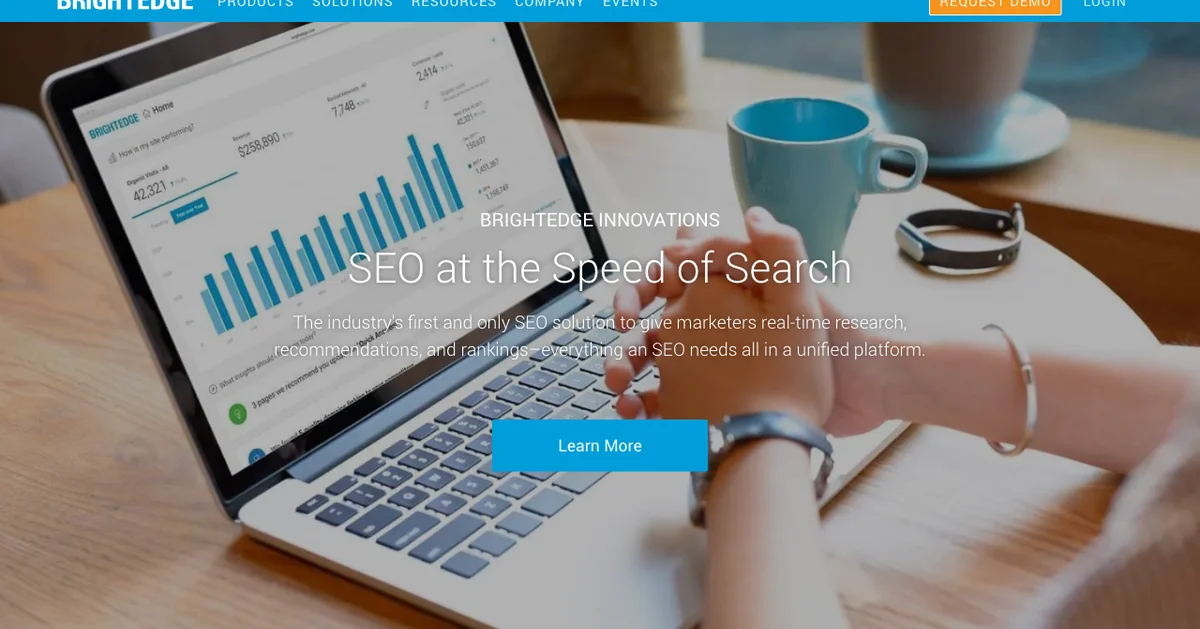
BrightEdge is a key player in the SEO software market, providing solid solutions for marketers looking to improve their online visibility and effectiveness. Unlike other tools that focus on specific aspects of SEO, BrightEdge combines everything in one platform. This enables marketers to access real-time insights, search recommendations, and ranking data in one place, streamlining their workflow and decision-making.
A notable feature is its ability to reveal consumer intent behind search queries. This helps companies understand what their customers are searching for and how to address those needs through targeted content. In addition, BrightEdge offers competitive analysis tools that allow users to see how their content compares to competitors, providing valuable insights that can shape marketing efforts.
BrightEdge serves as a comprehensive solution for SEOs, digital marketers, and content creators. The platform emphasizes the need to connect digital and physical interactions, making it easy for businesses to align their online strategies with local or mobile users. This flexibility can be especially helpful in a changing digital landscape.
Over 1,700 brands have used BrightEdge to refine their content marketing strategies, ensuring they not only meet but exceed the expectations of their target audiences. This capability makes it an attractive option compared to alt_23, especially for those seeking a competitive advantage.
Pros
- Real-time insights across various marketing efforts
- Thorough analysis of consumer intent and competitive landscape
- Unified platform that combines SEO, content, and social media tools
- Flexible for both digital and physical consumer strategies
Cons
- User interface may have a learning curve for newcomers
- Could be more expensive than other basic SEO tools
- May not specifically address niche marketing needs
SpyFu
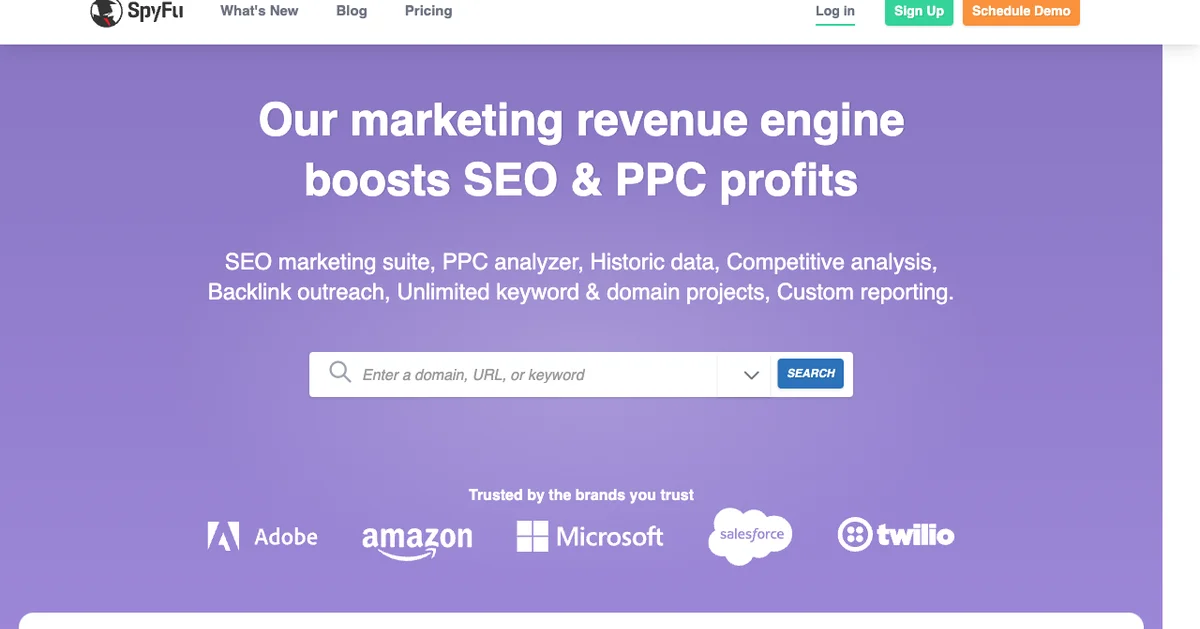
SpyFu stands out as a strong alternative to alt_23, especially for businesses focused on SEO and PPC strategies. Founded to simplify competitive analysis, SpyFu offers a wealth of historical data and tools that make it easy to understand what works for competitors. Their new AI feature, RivalFlow, addresses gaps in existing SEO content, which can boost rankings and improve online visibility.
One notable aspect of SpyFu is its detailed competitive research capabilities. Users gain insights into their rivals’ keyword strategies, ad history, and backlink profiles. This transparency allows businesses to learn from what others have done over the past 14 years, ensuring they don’t just keep up but potentially gain an edge. The platform’s keyword tracking and custom report options help users monitor performance and adjust tactics.
SpyFu’s integration capabilities are another area where it distinguishes itself. Businesses can run unlimited projects, organize keywords systematically, and keep all their research within a single interface. Scheduled reports make it easy to impress clients with data-driven insights and progress tracking.
For those managing both SEO and PPC efforts, SpyFu is particularly appealing. Their suite of PPC tools provides insights into competitor Google Ads strategies—allowing businesses to make informed decisions about their own campaigns. This dual focus on both organic and paid search gives users control over their online marketing efforts.
Pros
- Extensive historical data on competitors
- Easy-to-use platform for SEO and PPC research
- Custom reporting and keyword tracking
- New AI feature for content gap analysis
- Unlimited project management
Cons
- May require time to fully explore all features
- Could be overwhelming for newcomers to SEO and PPC
Majestic
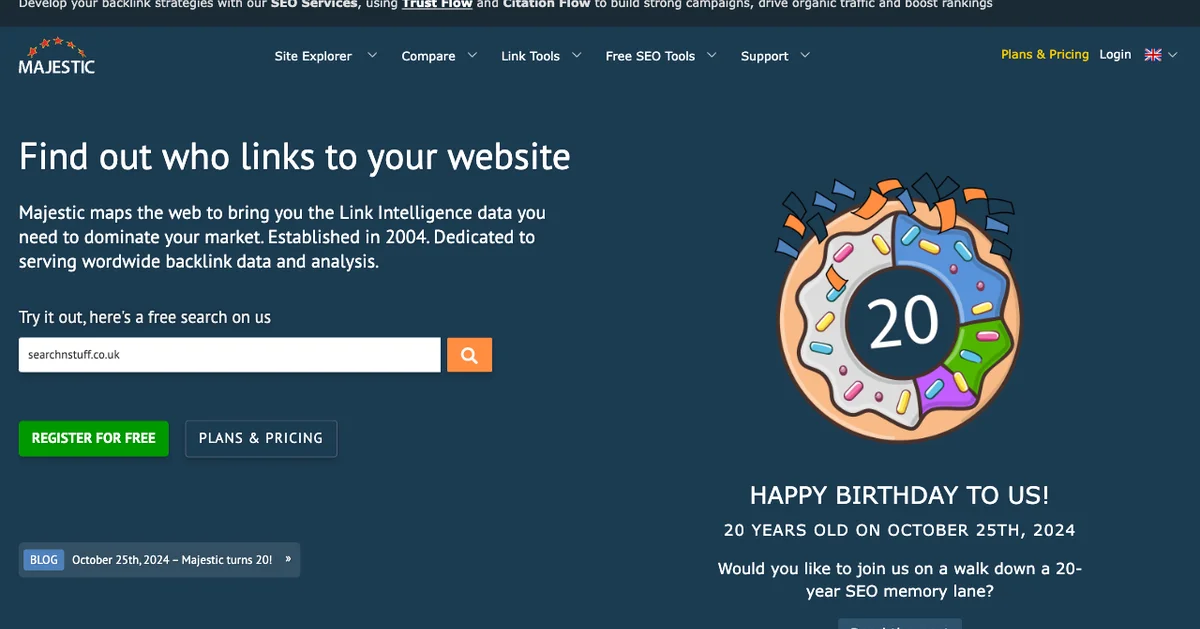
Majestic has established itself as a key player in the SEO landscape since 2004. With a focus on delivering backlink data and analysis, it has become a tool for marketers looking to improve their online visibility. The platform stands out with its approach to measuring link quality and relevance through metrics like Trust Flow and Citation Flow. Trust Flow evaluates the quality of the links pointing to a website, while Citation Flow assesses the quantity. This dual metric system provides users with insights not just into how many links they have, but how impactful those links are.
One of Majestic’s key features is the Topical Trust Flow, which categorizes links based on their relevance to over 800 topics. This allows users to gauge where their content stands against industry leaders, making it easier to plan for better link-building opportunities. Additionally, Majestic introduced the Author Explorer, which allows users to explore the work of specific authors, tracking their content and performance metrics. This feature can be helpful for identifying collaboration opportunities with influential figures in a given niche.
What sets Majestic apart from other options, such as alt_23, is its deep focus on link intelligence. While many tools provide a broad SEO toolkit, Majestic focuses on backlink analysis. For businesses of all sizes, this specialized approach can simplify their SEO strategies and offer clearer insights into their link-building efforts.
Pros
- Comprehensive backlink data
- Unique Trust Flow and Citation Flow metrics
- Topical Trust Flow for niche relevance
- Author Explorer for targeted outreach and collaboration
Cons
- Primarily focused on backlinks, less comprehensive in other SEO features
- Interface may seem complex for beginners
- Limited integration with other SEO tools
Serpstat
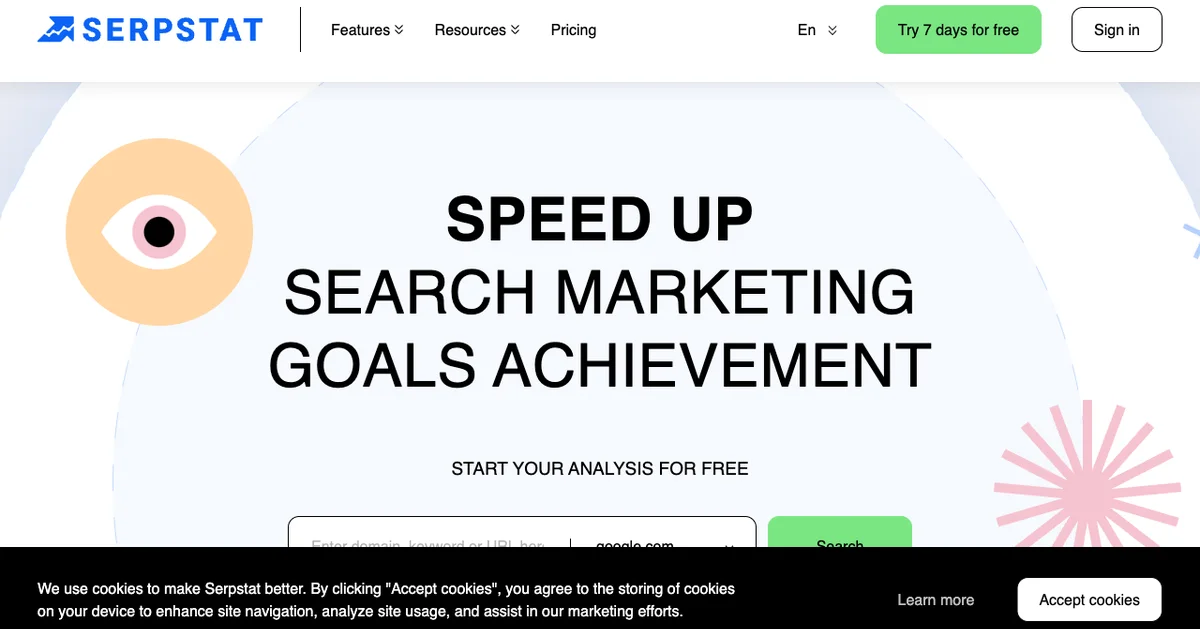
Serpstat is an SEO software that stands out in the field of search marketing tools. It simplifies search engine optimization, appealing to businesses aiming to reach their marketing goals faster. Offering a free initial analysis, Serpstat has gained trust from over 863,000 users who shared their experiences in over 600 reviews.
What sets Serpstat apart is its strong suite of features. Users can perform in-depth competitor analysis, revealing opportunities by examining competitor keywords and ad strategies. Its keyword research tool covers 230 countries and provides metrics like keyword difficulty and search volume, making it simple to plan PPC campaigns. Another important benefit is its site audit feature, which helps users identify technical issues on their website and prioritize them for correction.
Serpstat gained traction by helping marketers achieve their goals quicker and with less effort. The platform supports teamwork with multi-user accounts, catering to agencies and larger teams needing collaborative insights. Additionally, Serpstat offers AI content generation, keyword clustering, and plagiarism checking, improving its utility for digital marketers.
In summary, Serpstat is a solid alternative to alt_23 due to its comprehensive features for both SEO and PPC needs, user-friendly interface, and a focus on providing users with the knowledge to succeed.
Pros
- In-depth competitor analysis
- Strong keyword research across multiple countries
- User-friendly interface
- Comprehensive site audit tool
- AI content generation capabilities
- Multi-user account support
Cons
- Learning curve for new users
- May require time to explore all features
- Limited customer support options compared to larger competitors
Keyword Tool
Keyword Tool is gaining recognition as a strong alternative in the SEO software space, providing marketers and businesses with essential keyword insights. It uses Google Autocomplete, a feature that suggests search terms based on popular queries, to deliver long-tail keyword ideas. This approach allows users to discover keywords that are relevant and reflective of actual consumer searches. Unlike some keyword tools that rely on limited datasets, Keyword Tool pulls in suggestions from millions of searches, giving a broader view of what potential customers seek.
A key differentiator for Keyword Tool is its free version, which offers up to 750 keyword suggestions for each search term without requiring users to create an account. This makes it appealing for startups and small businesses that may be working with tighter budgets. The paid version, Keyword Tool Pro, enhances the offering by providing double the keyword suggestions and features that cater to more advanced needs, such as competitive analysis.
Keyword Tool’s interface is straightforward and user-friendly, serving not just seasoned marketers but also content creators and business owners who may be new to keyword research. The tool supports over 190 Google domains and more than 80 languages, making it versatile for global campaigns. This focus on user accessibility has made it a trusted resource for those looking to drive organic traffic to their websites.
Keyword Tool stands out for its ease of use, generous free offering, and reliance on Google Autocomplete to generate relevant, long-tail keywords.
Pros
- Up to 750 long-tail keyword suggestions for free
- User-friendly interface
- Works with 192 Google domains and 83 languages
- Strong focus on actual search trends
Cons
- May lack some advanced features found in other paid tools
- Free version has limited functionality compared to Pro
- Data based solely on Google Autocomplete, which might not cover every niche
Ubersuggest
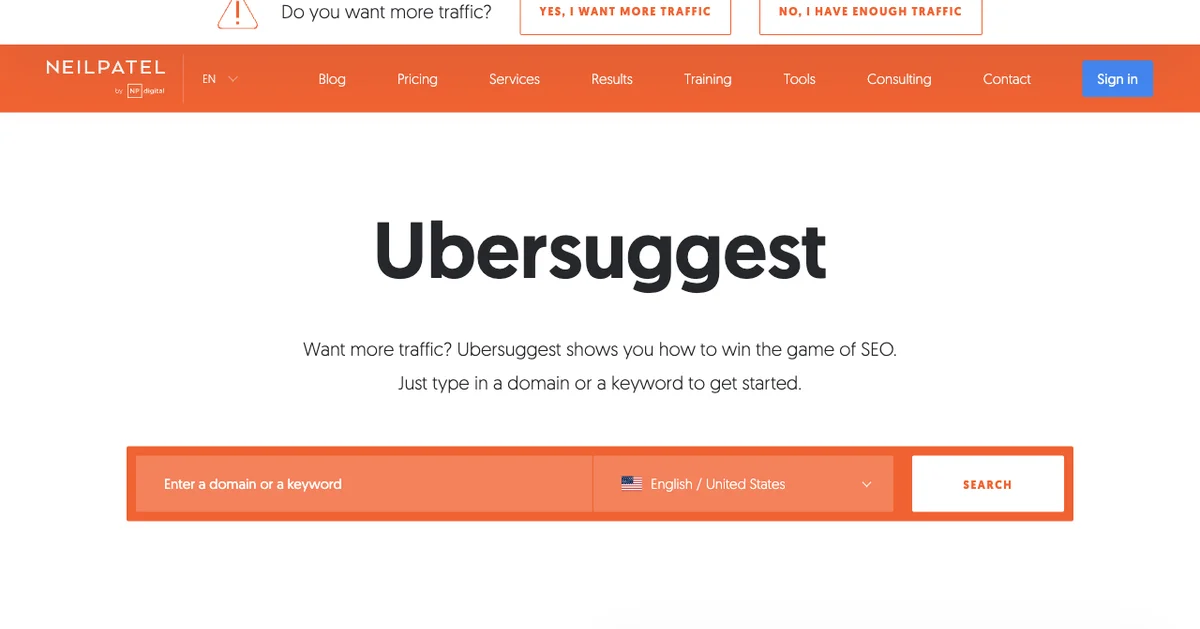
Ubersuggest, developed by marketer Neil Patel, is a user-friendly tool in the SEO software space. It stands out for its simple design and functionality, making it appealing to both experienced marketers and newcomers. Ubersuggest offers a solid range of features that focus on keyword research, competitor analysis, and site audits, all essential for improving online visibility.
One unique aspect of Ubersuggest is its goal of making SEO accessible to everyone. From the start, Neil Patel aimed to create a tool that simplified the complexities of SEO for small business owners. This vision has allowed Ubersuggest to be a helpful companion for those who may find traditional SEO tools overwhelming. Users can quickly generate keyword ideas, analyze traffic metrics, and track website performance—often at no cost or with affordable pricing tiers.
Another point of differentiation is its strong reporting capabilities. Ubersuggest provides insights into backlink data, giving users a clear view of their site’s authority and its potential to rank in search engines. Additionally, its extensive database enables users to find less competitive keywords, which can be a significant advantage for small businesses looking to carve out their niche.
Ubersuggest serves as a strong alternative to alt_23 in the SEO tools market. It combines simplicity and powerful features that appeal to a broad range of users.
Pros
- Intuitive user interface
- Strong keyword research and tracking features
- Comprehensive competitor analysis
- Affordable pricing options
Cons
- May lack some advanced features compared to top tools
- Limited in-depth insights for experienced SEO pros
CognitiveSEO
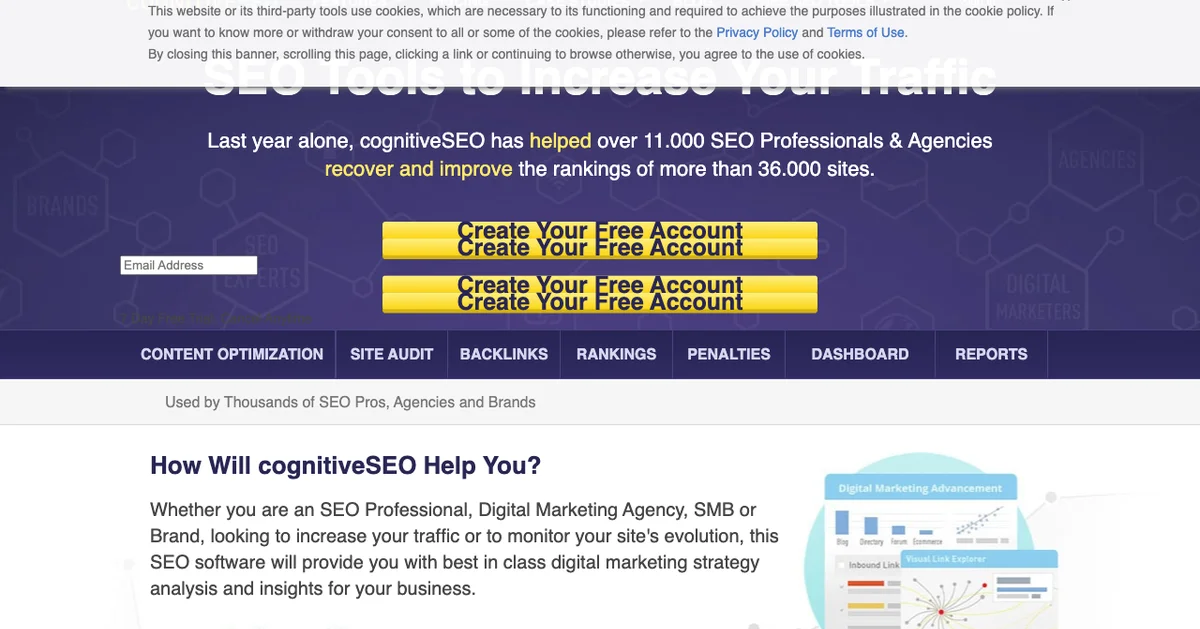
CognitiveSEO is a strong SEO software solution that helps businesses improve their online presence. Founded to simplify the complex world of SEO, it offers tools that address key challenges faced by marketers, webmasters, and agencies. Focused on issues like content performance and backlink analysis, CognitiveSEO stands out in the crowded SEO landscape.
One standout feature of CognitiveSEO is its AI-driven content optimization toolkit. This feature helps users understand how content influences rankings, providing a “Content Performance Score” that guides marketers toward actionable insights. Their emphasis on merging technical SEO with content relevance offers a unique advantage, allowing users to close gaps in their strategies effectively.
CognitiveSEO also excels with its comprehensive site audit capabilities. The tool crawls sites to reveal potential weaknesses and provides recommendations, making it easy for users to fix issues that could hurt their rankings. This proactive approach to identifying problems offers a significant advantage as search algorithms change.
For those worried about penalties, CognitiveSEO provides advanced link analysis features that help users identify and address issues with unnatural link profiles from past Google updates. This aids in recovering from penalties and setting up preventive measures that protect sites from future penalties.
CognitiveSEO caters to various audiences—from digital marketing professionals to small businesses—offering flexible pricing and accessible tools for all levels of expertise.
Pros
- Comprehensive toolset for on-page and off-page SEO
- AI-driven content optimization
- Detailed site audit and personalized recommendations
- Effective link analysis for penalty recovery
- User-friendly for varying levels of expertise
Cons
- May require time to master all features
- Could be overwhelming for users who prefer simpler tools
- Limited integrations compared to some competitors
Raven Tools
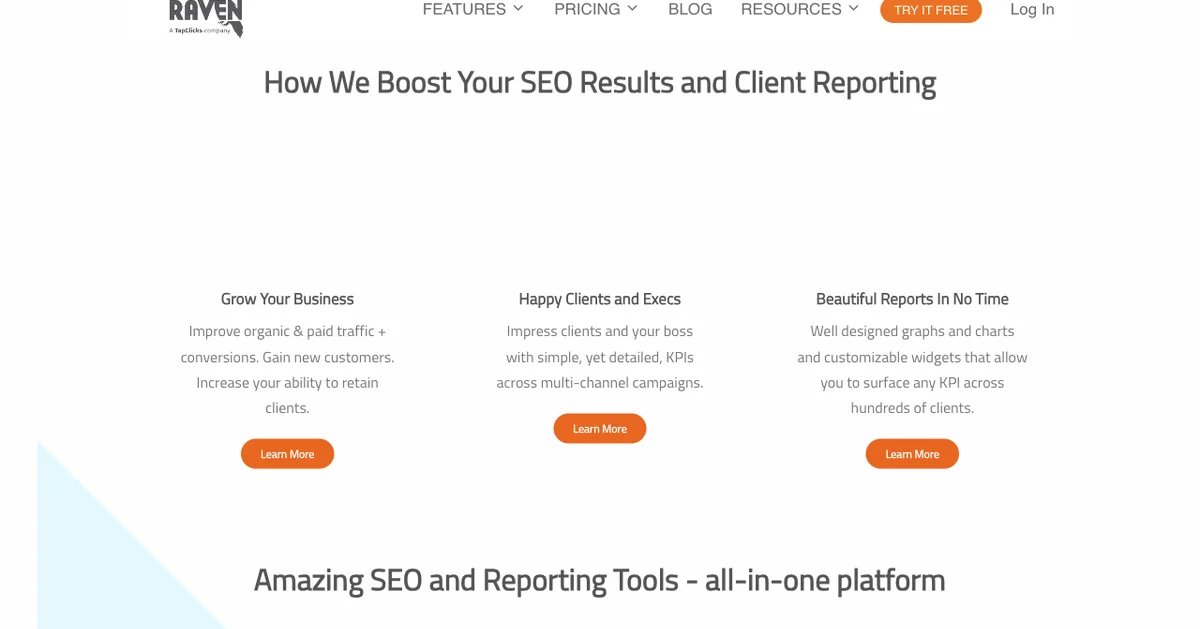
Raven Tools is making waves in the SEO software space as a platform that offers various features designed to improve organic and paid traffic, improve client reporting, and grow businesses. Founded with a mission to simplify the SEO process, Raven Tools excels in providing detailed insights that can impress clients and stakeholders. Their focus is on delivering actionable data through user-friendly interfaces, making it a preferred choice for agencies and businesses looking to boost their SEO efforts without getting bogged down in complexity.
A standout feature of Raven Tools is its website audit function. This tool identifies your site’s SEO issues and ranks them by severity, allowing users to address the most critical problems first. The Site Auditor generates a checklist for users, easing the burden of making necessary fixes and providing an option to share findings with webmasters or colleagues. This collaborative aspect can improve communication and improve efficiency within teams.
Raven also shines with its robust backlink analysis capabilities. Through its Backlink Explorer, users can sift through large amounts of backlink data to gain insights into competitor strategies and identify toxic links. Their Link Building Manager streamlines the process of managing these links, offering a solid approach to backlink strategy.
The Rank Tracker tool adds another layer, enabling users to track keyword rankings across various regions and search engines based on specific criteria. Customizable reports can be quickly created, and users can set them to run automatically, which is a time-saver.
In summary, Raven Tools stands out in the crowded SEO market thanks to its all-in-one platform, ease of use, and powerful reporting features.
Pros
- Comprehensive website audit and management tools
- Strong backlink analysis and management
- Flexible rank tracking across multiple search engines
- Customizable and automated reporting
Cons
- Can be overwhelming for complete novices
- Some advanced features may not be fully used by small businesses
Mangools
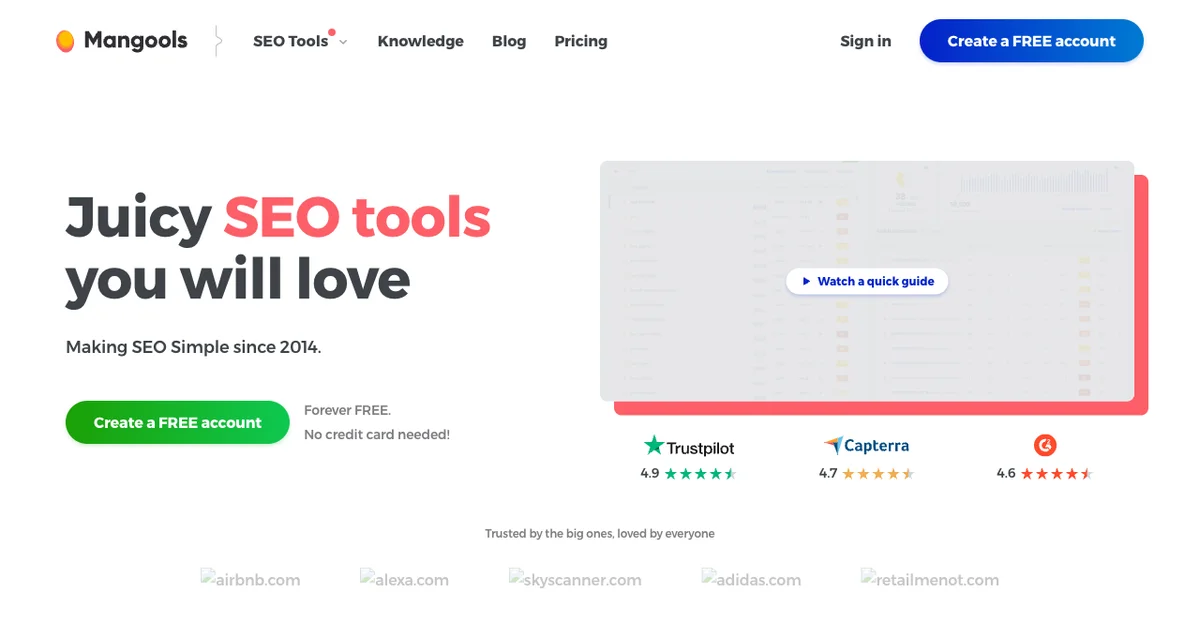
Mangools is a new player in the SEO tools market, established in 2014. Its mission is to make SEO accessible and enjoyable for everyone, especially those just starting out. With a user-friendly interface and clear data presentation, Mangools stands out from more complex options like alt_23.
One standout feature is its keyword research tools, which use a unique keyword difficulty metric that many users find helpful. Their performance index provides insight into how well content ranks, giving users a clear view of their success. For those focusing on backlinks, Mangools offers a proprietary metric called Link Strength that assesses the quality of links, an important factor for effective SEO.
Another key aspect is their customer support, which is not staffed by generic agents. Users connect with real SEO professionals who practice what they preach daily. This kind of assistance can make a significant difference, particularly for those looking for help in navigating the often complex field of SEO.
Pricing is another important point of difference. At just $29 per month, Mangools positions itself as a cost-effective option compared to larger, more expensive platforms. This makes it appealing for small businesses and bloggers seeking comprehensive tools without high costs.
In summary, Mangools offers simplicity, powerful features, and expert support, making it an attractive option compared to alt_23.
Pros
- User-friendly interface
- Unique keyword difficulty metrics
- Strong backlink analysis
- Excellent customer support
- Affordable pricing
Cons
- Less comprehensive than larger tools
- May not meet the needs of advanced users
Conductor
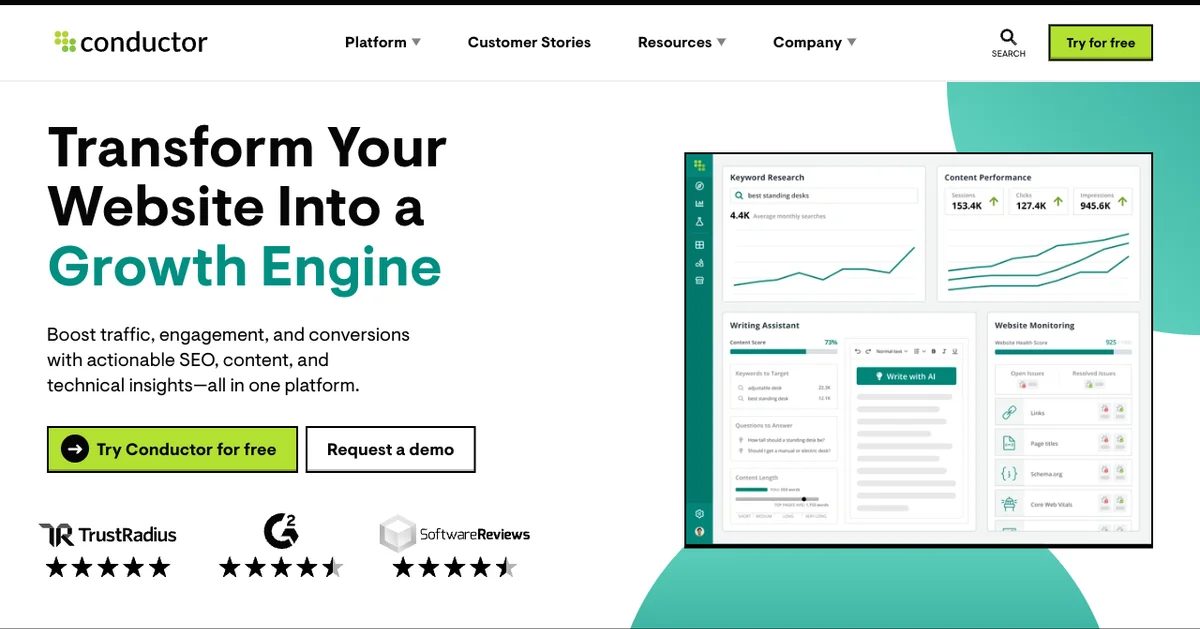
Conductor is a strong SEO and marketing platform that transforms websites into growth engines. Its mission is to improve organic search visibility, offering a mix of SEO, content creation, and website monitoring features. Conductor’s strength lies in integrating various aspects of digital marketing under one platform, making it an attractive option for businesses exploring alternatives to alt_23.
A key feature of Conductor is its AI-powered content recommendations and workflow automation, which boost team productivity while ensuring content is engaging and optimized for search engines. This benefits teams juggling multiple projects who want to streamline their efforts without compromising quality. Additionally, Conductor invests in website performance management with continuous monitoring, allowing businesses to quickly resolve issues that could impact site traffic and user experience.
Conductor’s story is rooted in its focus on customer success. The platform has helped major brands like Samsung and Citibank integrate SEO into their marketing strategies, illustrating its real-world effectiveness. Client feedback highlights the platform’s ability to provide a centralized source of truth for website optimization, allowing for clear reporting on key metrics and actionable insights.
In summary, Conductor could be a game-changer for your SEO and content strategy. Its comprehensive approach to digital presence management and commitment to improving customer experience set it apart.
Pros
- AI-powered content recommendations and workflow automation
- Continuous website performance monitoring
- Centralized reporting for better decision-making
- Proven track record with major brands
Cons
- Steeper learning curve for new users
- Pricing may vary based on features and user needs
- Some features may exceed what small teams require
Searchmetrics
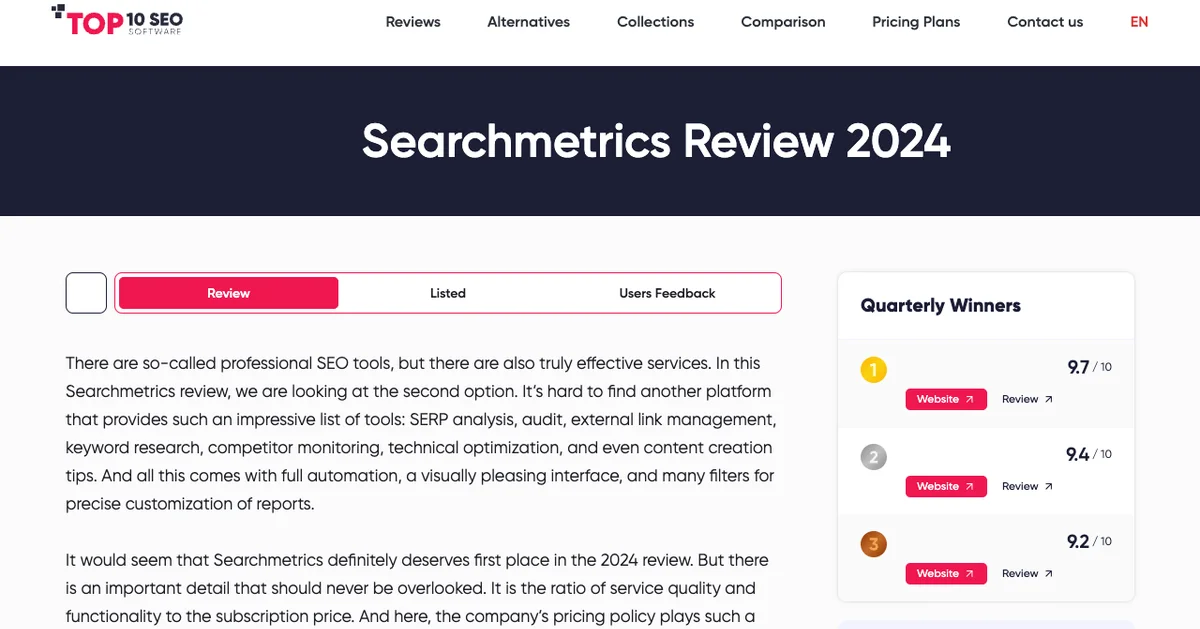
Searchmetrics is a key player in the SEO tools market, known for its suite of offerings designed to improve online visibility. Founded over a decade ago, the company has built a reputation for delivering SEO solutions that combine a user-friendly interface with powerful automation. Its database, with over 250 billion data points, sets it apart from many competitors.
The platform includes features like SERP analysis, keyword research, content recommendations, and competitor monitoring. This all-in-one approach appeals to marketing agencies and enterprises that demand thorough insights into their SEO strategies. Searchmetrics operates its own crawl database, ensuring data accuracy and reliability, unlike some rivals that depend on third-party data. They often secure high-profile clients, including eBay, Lufthansa, and T-Mobile, showcasing their credibility.
A unique offering from Searchmetrics is its content optimization tool, which benchmarks web pages against top-ranking competitors for specific keywords. This feature helps businesses refine their content strategies. Users appreciate the unlimited projects and personal support available on any plan, making it a versatile choice for various needs. The pricing structure can be unclear, with potential users needing to negotiate costs via call or email. The plans cater primarily to businesses with significant SEO budgets.
Searchmetrics stands out for its comprehensive features and commitment to quality. The pricing and complexity of its offerings might deter smaller businesses or those starting in SEO endeavors.
Pros
- Extensive tools for SERP analysis and competitor tracking
- In-house crawl database enhances data reliability
- Unlimited projects and personal support across all plans
- Strong focus on content optimization
Cons
- Pricing can be non-transparent and costly
- Limited language support for multilingual research
- Lacks sufficient keyword data in smaller countries
- Mandatory 12-month contracts may not suit everyone
DeepCrawl
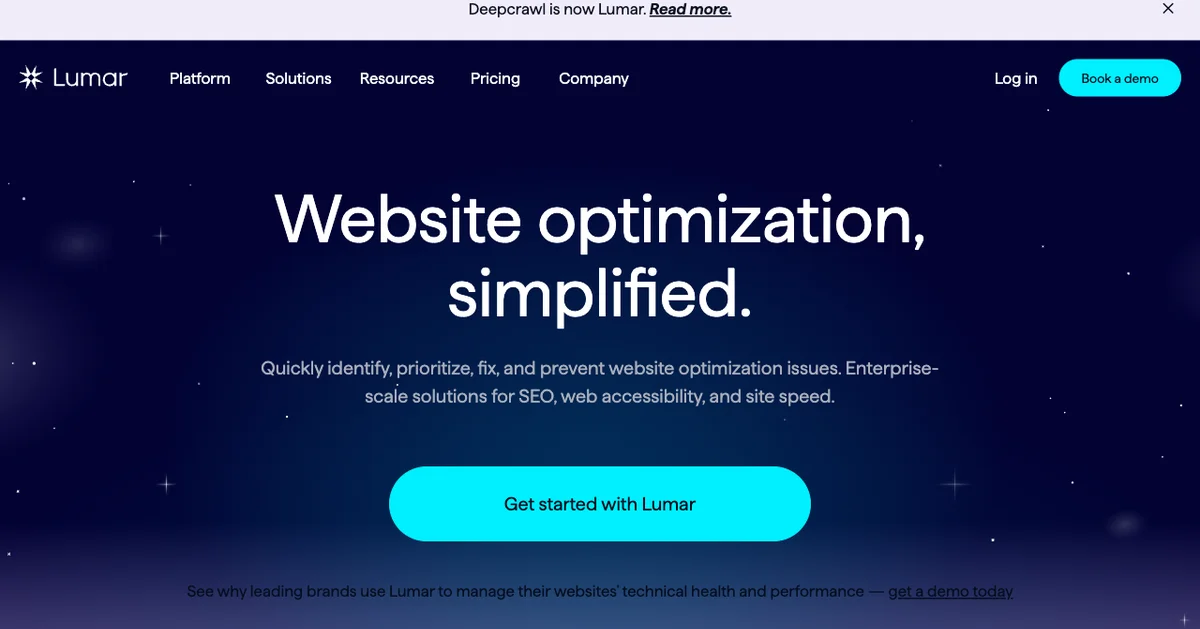
DeepCrawl, now branded as Lumar, offers a strong alternative to alt_23 in the SEO software landscape. Lumar aims to simplify website optimization and handle the complexities of modern sites. Their platform delivers actionable insights, helping teams identify and resolve technical issues effectively.
Lumar stands out with its combination of features tailored for large enterprises. It meets the demands of website optimization through advanced analytics and AI-driven insights. Their smart ticketing system helps teams manage technical issues, while customizable alerts keep everyone informed with minimal effort. Lumar’s platform is built for speed and can crawl up to 450 URLs per second, providing timely data that businesses need to remain competitive.
The story behind Lumar shows a commitment to addressing web complexities. It combines technical SEO with key elements like site speed and web accessibility, emphasizing that an optimized site is essential for business success. Lumar offers a clear path to reduce risks of lost traffic and missed revenue opportunities. Their wide range of reports eases the data overload many teams face, allowing for clearer communication and prioritization of tasks.
Lumar’s platform enables website teams to be proactive rather than reactive. They can address issues before they escalate, giving businesses an edge in the crowded digital space.
Pros:
- Fast URL crawling (up to 450 URLs/sec)
- AI-supported insights and ticketing
- Focus on web accessibility and technical SEO
Cons:
- May be more complex than necessary for smaller websites
- Some users might find the learning curve steep
Sitebulb
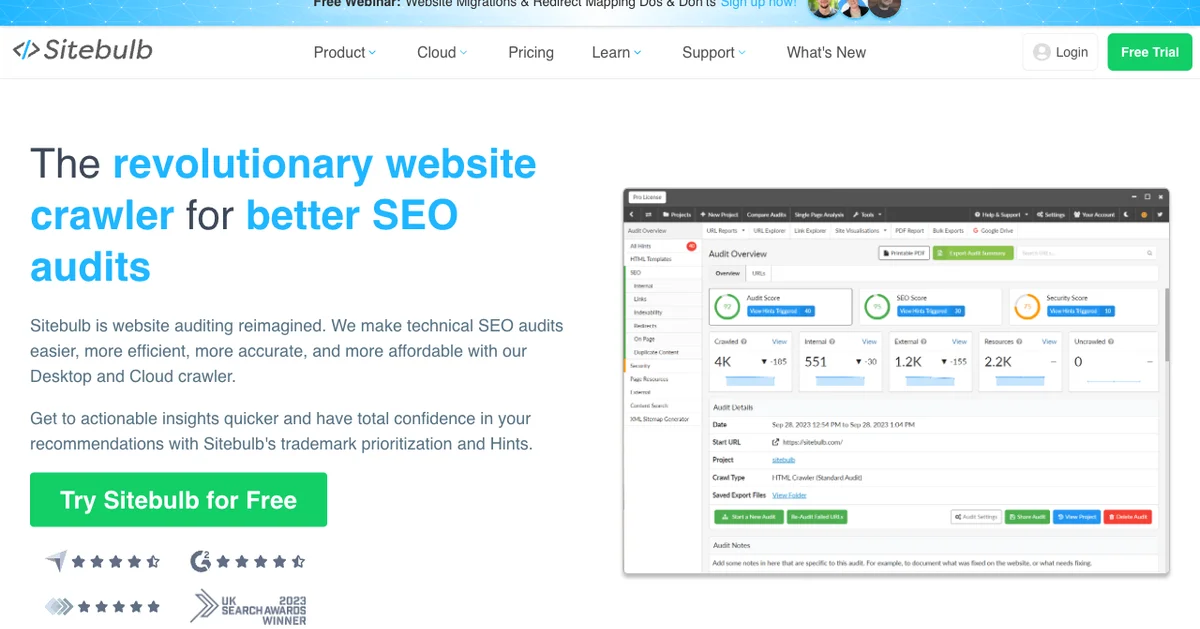
Sitebulb is a new player in the SEO field, focusing on simplifying website audits and technical SEO. The team behind Sitebulb created a solution that is powerful and user-friendly, understanding that navigating technical SEO can be challenging. They designed their platform to deliver insights quickly, allowing users to prioritize their next steps effectively.
One of Sitebulb’s standout features is its dual offering: a Desktop version for detailed single audits and a Cloud version that enables large-scale crawling across the web. This flexibility is significant. While some users may need detailed analyses of smaller websites, others handle large projects needing to crawl millions of URLs simultaneously. Sitebulb allows collaboration as multiple team members can work on the same project in real-time with Cloud.
The platform includes helpful visuals and prioritization hints that guide users on where to focus their efforts. This feedback can set Sitebulb apart from alt_23, especially for those in fast-paced environments like digital agencies and freelancers. Understanding technical issues is essential, and Sitebulb provides clear explanations, making it easier to share findings with clients.
Sitebulb integrates well with other tools, such as Google Analytics and Google Search Console, streamlining workflows. The lack of restrictive crawl credit systems means users can explore their websites freely without worrying about running out of credits.
Sitebulb stands out for its user-friendliness, flexibility in crawling capabilities, and strong visual insights, making it a worthy alternative to alt_23.
Pros
- User-friendly interface
- Desktop and Cloud versions available
- Real-time collaboration
- Transparent prioritization hints
- No crawl credit restrictions
Cons
- May lack some advanced features compared to competitors
- Learning curve for complete novices
SEO PowerSuite
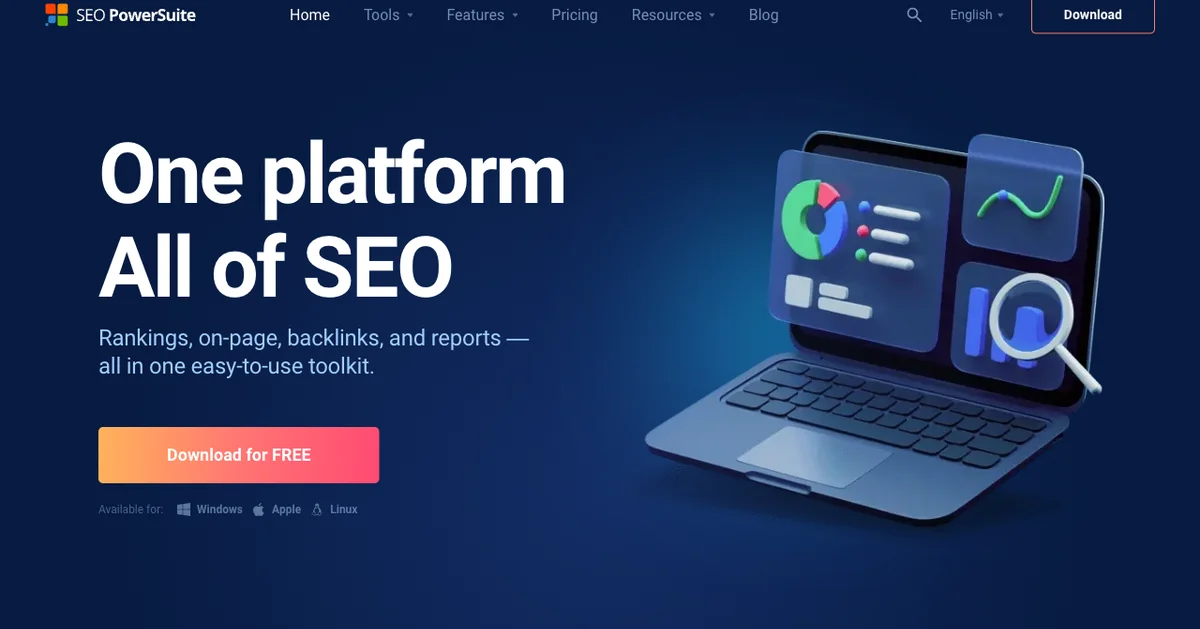
SEO PowerSuite has established itself as a player in the SEO software market, providing a platform designed to address every aspect of SEO. With nearly two decades in the industry, they have built a solid reputation, serving over two million users worldwide. This toolkit features four main tools: Rank Tracker for monitoring keyword positions, WebSite Auditor for on-site optimization, SEO SpyGlass for backlink analysis, and LinkAssistant for link-building efforts.
One key differentiator of SEO PowerSuite is its all-in-one approach. Instead of offering individual tools, they integrate multiple functions into one platform, making it easier for users to manage their SEO campaigns. This appeals to businesses that prefer a cohesive solution rather than managing various separate tools. The user interface is intuitive, catering to both experienced SEO professionals and newcomers, which lowers the learning curve.
Another aspect is their strong data foundation, offering trusted metrics that help users make informed decisions. SEO PowerSuite’s software is designed for flexibility, supporting various use cases, from small businesses to larger organizations. Users appreciate the option to download the software for free, allowing them to explore its features without upfront commitment.
SEO PowerSuite’s story focuses on empowering users to grow their businesses through effective SEO practices. Their consistent updates and customer-focused development ensure they adapt to the changing digital landscape, fostering loyalty from their user base.
Pros:
- All-in-one SEO toolkit simplifies campaign management
- Free download allows users to test features before buying
- Trusted metrics and data support informed decision-making
- Scalable solution for different business sizes and needs
Cons:
- Some users may prefer niche tools with specialized features
- Learning curve may exist for advanced features.
Nightwatch
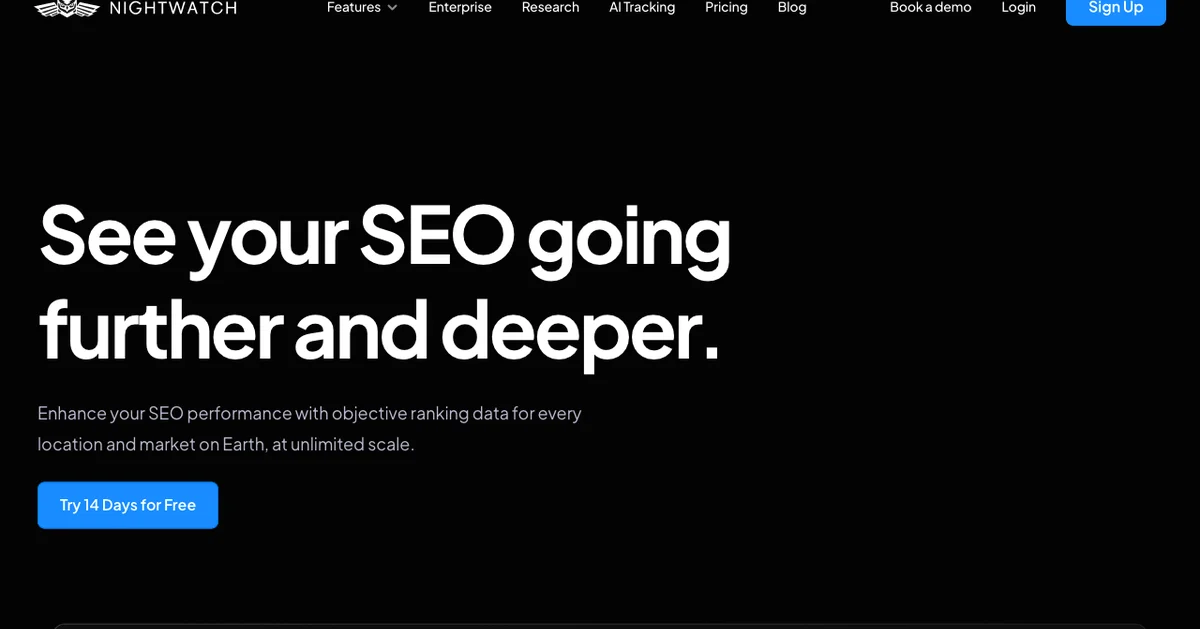
Nightwatch is a strong SEO tracking tool designed for companies seeking to expand their global online presence. Their focus is on providing accurate ranking data across various locations, making them a valuable alternative to Seobility. This platform suits enterprises looking to manage performance at scale.
Nightwatch’s roots lie in their commitment to offering real-time insights. Users can track a large number of search queries—up to hundreds of thousands—without concerns about performance or visibility. This scalability sets them apart in a market where many tools struggle to provide wide coverage. Their intuitive dashboard allows users to quickly identify trends and opportunities, enabling fast decision-making.
One standout feature of Nightwatch is its accuracy. Users benefit from clear and reliable data that can justify and predict organic growth. The ability to build automated, easy-to-understand reports, branded for client use, enhances Nightwatch’s appeal. This ensures that stakeholders can easily grasp SEO performance, fostering better communication between teams.
Nightwatch suits businesses operating in competitive markets or multiple regions. Their platform offers a complete view of all website assets, enabling a streamlined SEO strategy. With a focus on enterprise-level needs, they position themselves as a solution for brands aiming to maintain a significant online presence.
Pros
- Comprehensive tracking across 190,000 locations.
- Scalable performance for tracking large amounts of queries.
- Real-time insights for quicker decision-making.
- Automated, white-labeled reporting for client and internal use.
Cons
- May be more complex for smaller businesses with simpler needs.
- Focus on enterprise might overlook features appealing to casual users.
Link-Assistant
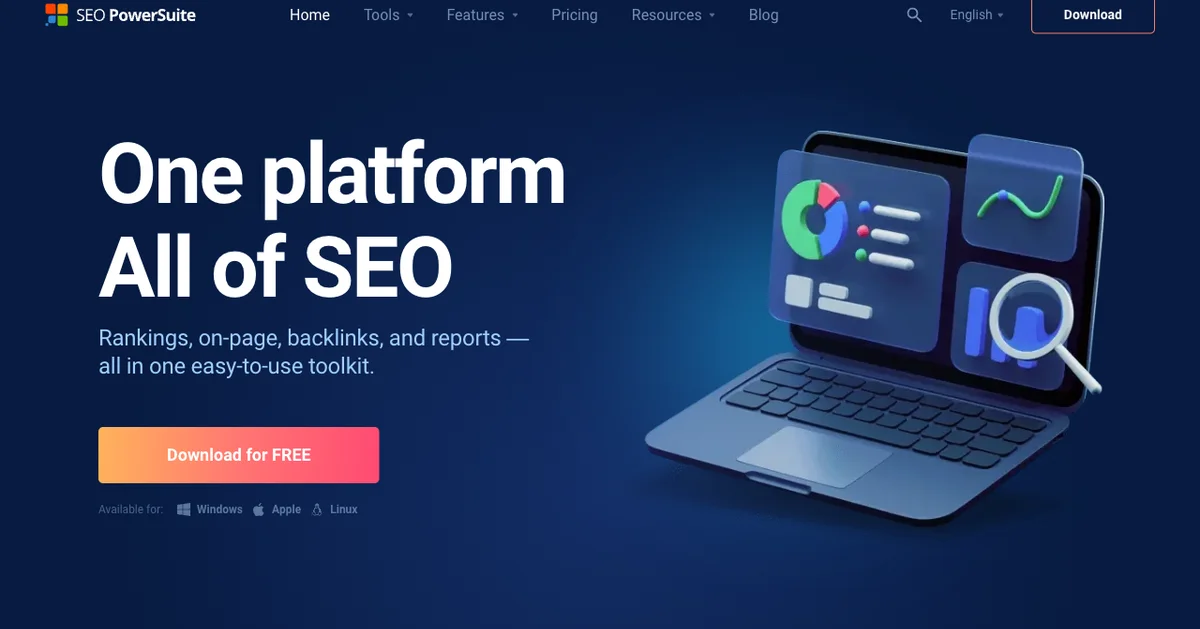
Link-Assistant is the creator of SEO PowerSuite, an integrated platform aimed at simplifying SEO challenges for marketers and business owners. For nearly 20 years, they have positioned themselves as a reliable ally in the SEO landscape. With a user base of over 2 million, their tools are trusted by professionals worldwide, demonstrating the effectiveness of their offerings.
What sets Link-Assistant apart are the comprehensive tools included in SEO PowerSuite. The suite features four key components: Rank Tracker, WebSite Auditor, SEO SpyGlass, and LinkAssistant. Each tool plays a vital role in the SEO process, from tracking keyword performance to conducting website audits and analyzing backlinks. This all-in-one approach minimizes the hassle of managing multiple tools, making it an attractive alternative to alt_23.
Link-Assistant’s story is rooted in a commitment to helping businesses grow through better online visibility. They prioritize user experience, taking feedback from thousands of customers to refine their software continuously. This feedback loop ensures they respond to user needs, allowing their tools to adapt with the changing SEO landscape.
Another advantage of SEO PowerSuite is accessibility. Users can download the software for free to explore its features before making a financial commitment. This eases the entry for new marketers and small business owners without concerns about upfront costs.
In summary, Link-Assistant’s SEO PowerSuite offers a solid option if you’re considering alternatives to alt_23.
Pros
- Comprehensive all-in-one SEO toolkit
- Extensive user base with proven results
- Continuous software improvement based on user feedback
- Free trial available for new users
Cons
- The range of features may overwhelm beginners
- Learning curve for mastering all tools within the suite
Advanced Web Ranking
Advanced Web Ranking (AWR) has been a fixture in the SEO tools space for over 20 years, appealing to agencies and teams focused on search engine optimization. AWR helps businesses track their visibility in organic search across various platforms and locations. A key feature is its ability to track not just Google rankings, but also those on platforms like YouTube, Amazon, and country-specific search engines such as Baidu and Naver.
Another notable feature is the detailed competitor analysis. AWR allows tracking up to 50 competitors targeting similar keywords at no extra cost. This insight helps in understanding market position and adjusting strategies. The tool also offers unique features like SERP features analysis and comprehensive CTR data, allowing users to assess visibility metrics accurately.
AWR strongly supports SEO agencies by offering unlimited users and projects, making it scalable as teams grow. The ability to generate white-label reports and share them easily improves client communication and highlights the value of SEO efforts.
Their story reflects innovation and adaptability. Over the years, AWR has integrated with key platforms like Google Analytics and Search Console, simplifying the SEO reporting process. A risk-free trial lets businesses explore the tool’s benefits without financial commitment.
Pros
- Tracks rankings across multiple search platforms
- Comprehensive competitor analysis
- Unlimited projects and users for agencies
- White-label reporting options
- Integrates well with essential tools
Cons
- May overwhelm smaller businesses with features
- Learning curve for beginner users
- Price may be higher compared to some alternatives
WebCEO
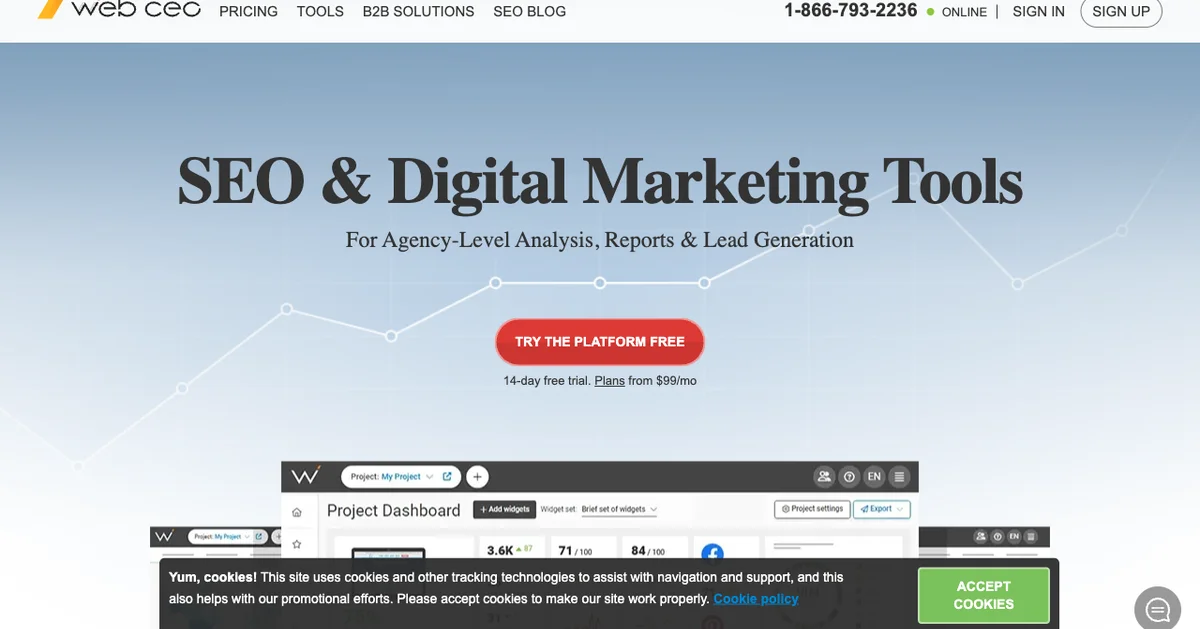
WebCEO is a strong player in the SEO software and tools market, focusing on agency-level needs. Founded to streamline SEO processes, WebCEO has developed a suite of 23 SEO tools, making it a compelling alternative to Seobility.
One standout feature is the collaborative workspace, allowing teams to manage SEO projects remotely. This is beneficial for agencies handling multiple clients, as they can assign tasks without giving up full account access. Teams can stay synchronized and productive, tackling tasks clearly. The Task Manager consolidates all SEO issues from various tools, easing project management.
WebCEO also offers a notable lead generation capability. Agencies can embed a custom widget on their websites, letting potential clients request SEO reports branded with the agency’s logo. This feature not only impresses prospects but also helps convert them into clients by showcasing the agency’s expertise.
The user-friendly interface is another highlight. Users appreciate how simple it is to create detailed reports filled with actionable data. Clients value clarity and specificity, and WebCEO provides that, avoiding the “smoke and mirrors” often linked with SEO reporting.
WebCEO’s pricing is flexible, supporting businesses of different sizes. Users don’t face the budget strain common with many enterprise tools. The platform also guarantees support from a responsive team, which is often a deciding factor for agencies navigating the SEO landscape.
Pros
- Collaborative workspace for remote teams
- Lead generation widget for client acquisition
- Easy-to-use interface for generating detailed reports
- Flexible pricing model for various budgets
- Excellent customer support
Cons
- Primarily designed for agencies, which may not suit individual users
- Some users might find the number of tools overwhelming at first
Uberflip
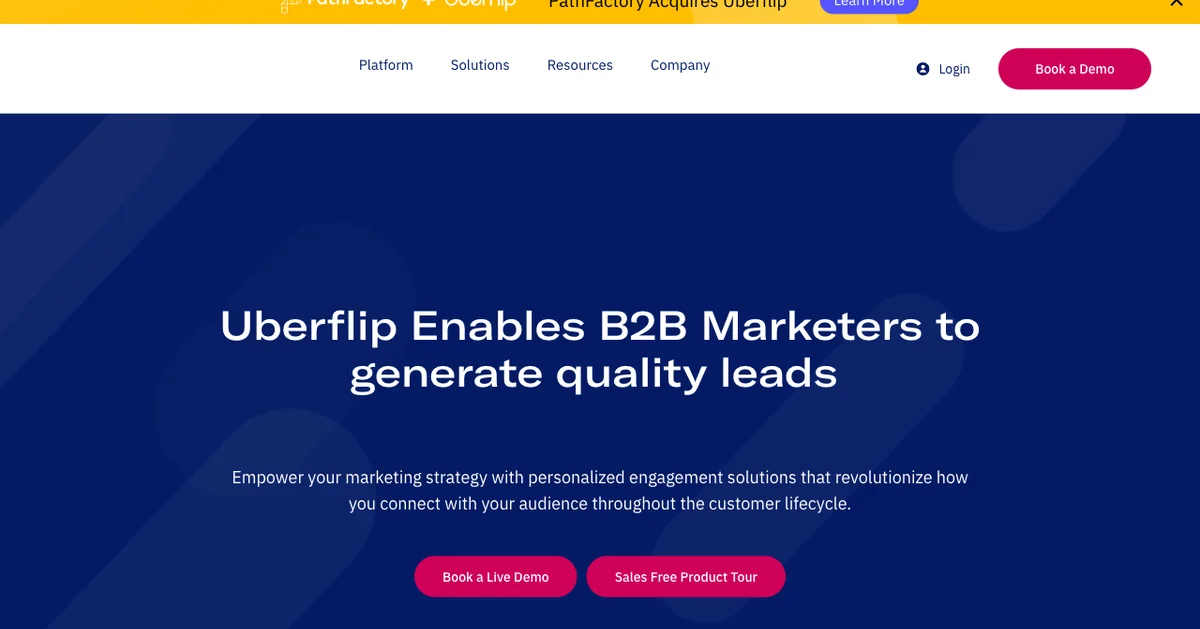
Uberflip is a platform targeting B2B marketers, focusing on improving engagement and conversion rates for specific audiences. It empowers businesses to create personalized experiences throughout the customer lifecycle. The approach combines content curation, management, and analytics, allowing teams to meet their marketing goals efficiently. Uberflip’s story began with a vision to change how content is consumed, evolving into a tool that helps companies connect with potential customers meaningfully.
What sets Uberflip apart from alternatives like alt_23 is its emphasis on personalized engagement solutions. With features like dynamic content curation and centralized content planning, marketers can design customized pathways for their audience. The platform offers instant publishing capabilities and complete measurement tools, enabling users to track performance and understand ROI clearly. This focus on creating tailored experiences can significantly improve lead generation and conversion, as seen in success stories where companies reported notable increases in key metrics.
Additionally, Uberflip has a suite of integrations that improve its use with marketing and sales tools, beneficial for teams seeking a seamless workflow. The platform is especially useful for account-based marketing (ABM) strategies, allowing teams to engage target accounts effectively.
Pros
- Tailored engagement solutions
- Comprehensive analytics and measurement
- Centralized content management
- Strong integrations with other tools
Cons
- May require time to implement fully
- Pricing could be a concern for smaller businesses